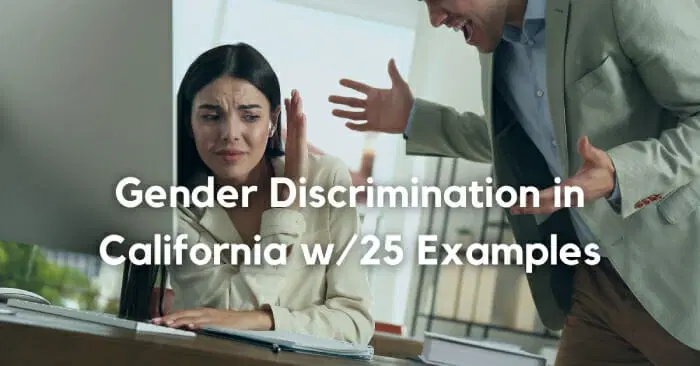
Gender Discrimination in California Explained in 25 Examples
Legally reviewed by: Jessica Anvar Stotz, JD, MBA
Updated on: 8/17/23
Short answer: Gender discrimination in California refers to the unfair treatment or disparate impact experienced by individuals based on their gender or gender identity, including but not limited to disparities in pay, hiring, promotions, and workplace conditions.
Gender discrimination encompasses the unfair treatment and detrimental impact suffered by individuals based on their gender or gender identity. This pervasive problem extends across various facets of life, including employment, where disparities in pay, hiring practices, promotions, and workplace conditions persist.
California Gender Discrimination at a Glance
| Factors | Description |
| Pay Disparity | Unequal pay for the same work based on gender |
| Stereotyping | Making assumptions about abilities based on gender |
| Unequal Promotions | Advancement opportunities favoring one gender |
| Hostile Work Environment | Creating discomfort through gender-based actions |
| Exclusion from Decision-Making | Leaving out certain genders from important choices |
| Sexual Harassment | Unwanted advances or comments of a sexual nature |
| Pregnancy Discrimination | Treating employees unfairly due to pregnancy |
| Unequal Training Opportunities | Denying skill development based on gender |
| Microaggressions | Subtle, hurtful remarks or actions targeting gender |
| Dress Code Discrimination | Imposing different rules for different genders |
| Lack of Family Leave Support | Inadequate policies for parental or family leave |
Is Gender Discrimination Illegal in California
Yes, gender discrimination is illegal in California. There are California gender discrimination laws in place to protect individuals from gender-based discrimination, including in the workplace.
The California Fair Employment and Housing Act (FEHA) prohibits employers from engaging in discriminatory practices based on gender, such as unequal pay, promotion denials, or harassment. It covers various aspects, including hiring, firing, job assignments, and working conditions.
California law also requires employers to provide a safe and inclusive work environment free from gender-based bullying or harassment. Victims of gender discrimination can file complaints with the California Department of Fair Employment and Housing (DFEH) or pursue legal action to seek remedies and hold employers accountable.
What Are Some Examples of Gender Discrimination in California?
- Unequal Pay: Paying male employees more than their equally qualified female counterparts for the same job.
- Glass Ceiling: Denying qualified women promotions or advancement opportunities based on their gender.
- Gender-Based Job Assignments: Assigning certain tasks or roles based on traditional gender stereotypes rather than individual qualifications.
- Maternity Discrimination: Penalizing or treating female employees unfairly due to pregnancy or maternity leave.
- Sexual Harassment: Subjecting employees, particularly women, to unwanted sexual advances, comments, or behaviors.
- Hiring Bias: Preferring male candidates over equally qualified female candidates during the hiring process.
- Promotional Bias: Overlooking women for promotions and leadership positions in favor of less qualified male counterparts.
- Hostile Work Environment: Creating an intimidating or offensive work atmosphere through sexist jokes, derogatory comments, or objectification of women.
- Retaliation: Punishing or retaliating against women who speak up against gender discrimination or harassment.
- Unequal Training Opportunities: Providing fewer training and development opportunities to female employees compared to their male counterparts.
- Pregnancy-Based Stereotyping: Assuming that women’s commitment and competence diminish after becoming mothers, resulting in adverse treatment.
- Dress Code Discrimination: Enforcing stricter dress code standards for women compared to men, based on gender-specific expectations.
- Family Responsibility Discrimination: Treating employees differently due to their caregiving responsibilities, disproportionately affecting women.
- Limited Networking Opportunities: Excluding women from networking events or professional opportunities that can enhance career growth.
- Microaggressions: Engaging in subtle, everyday behaviors or comments that demean or belittle women, perpetuating gender stereotypes.
- Unequal Access to Flexible Work Arrangements: Denying requests for flexible work arrangements, such as remote work or alternative schedules, predominantly impacting women.
- Weight-Based Discrimination: Subjecting women to discriminatory practices based on their weight, such as biased hiring or unfair treatment.
- Unequal Training and Mentorship: Providing insufficient training, mentorship, or sponsorship opportunities for women to advance in their careers.
- Career Segregation: Restricting women to specific roles or departments, limiting their opportunities for career growth and advancement.
- Dismissive Attitudes: Disregarding or devaluing women’s contributions, ideas, or expertise in the workplace.
- Unequal Access to Resources: Providing fewer resources, budgets, or support for projects led by women compared to male counterparts.
- Double Standards: Applying different standards or expectations to women and men in terms of behavior, dress, or communication styles.
- Lack of Representation: Failing to include women in decision-making processes or leadership roles, resulting in underrepresentation.
- Retirement Discrimination: Offering women fewer retirement benefits or pensions compared to men with similar qualifications and experience.
- Unequal Performance Evaluation: Applying biased criteria or standards during performance evaluations, resulting in lower ratings or fewer opportunities for women.
Example Scenarios of Workplace Bullying
Scenario #1 (Unequal Pay)
Sarah and Mark, two employees in a California workplace, have identical job roles, qualifications, and experience.
However, Sarah consistently receives a significantly lower salary compared to Mark, despite their equal contributions. This wage disparity solely based on gender constitutes gender discrimination, as Sarah is being unfairly paid less than her male counterpart for performing the same job.
This unequal pay not only undermines Sarah’s financial security and career advancement but also perpetuates gender-based wage inequity, which is prohibited by California law. Addressing and rectifying such discriminatory practices is essential to ensure fair treatment and equal opportunities for all employees.
Scenario #2 (Gender-Based Job Assignments)
Lisa and Alex work for the same company with equal qualifications and skills. However, Lisa consistently receives assignments that are administrative in nature, while Alex is assigned to challenging and high-profile projects that offer opportunities for career advancement.
This disparity in job assignments based on gender is a clear case of gender discrimination. Lisa’s potential for growth and professional development is hindered, as she is systematically relegated to less influential and less challenging tasks solely because of her gender.
Such discriminatory practices not only limit Lisa’s career prospects but also reinforce gender stereotypes and violate California laws that prohibit gender-based discrimination in job assignments.
Scenario #3 (Maternity Discrimination)
Rachel, a highly skilled and dedicated employee, informs her supervisor, John, about her pregnancy and the need for maternity leave.
However, upon returning from her leave, Rachel discovers that she has been stripped of her key responsibilities and demoted to a lower position, despite her strong performance prior to pregnancy.
The demotion and reduced opportunities for growth and advancement solely based on her maternity status represent clear maternity discrimination. Rachel’s commitment and capabilities are overlooked, and she faces adverse treatment due to her pregnancy.
Such discriminatory actions violate California laws that protect employees from discrimination based on pregnancy and maternity leave, undermining the principles of equality and fair treatment in the workplace.

When You Can & Can’t Sue for Gender Discrimination
Gender discrimination is a pervasive issue that can have detrimental effects on individuals in various aspects of their lives, including employment. Fortunately, in the state of California, there are robust laws in place to protect individuals from gender-based discrimination, particularly in the workplace.
However, it is essential to understand the circumstances under which one can and cannot sue for gender discrimination to navigate the legal landscape effectively.
When You Can Sue
In California, individuals can sue for gender discrimination when they have experienced adverse employment actions based on their gender. These actions may include unequal pay, denial of promotions, unfair job assignments, or hostile work environment due to gender.
To sue for gender discrimination, you must demonstrate that the adverse employment actions were motivated by gender bias. This typically requires that you present evidence of differential treatment based on gender, such as explicit discriminatory statements, a pattern of biased decision-making, or statistical disparities.
Note that the burden of proof lies with the individual filing the lawsuit and establishing a clear link between the adverse actions and gender discrimination is critical to the success of the case.
When You Can’t Sue
However, there are certain circumstances where individuals may not be able to sue for gender discrimination. For instance, if the employer has fewer than five employees, the protections under the FEHA may not apply.
Additionally, if the alleged discriminatory actions fall outside the scope of FEHA’s protections, such as discrimination based on gender identity or expression, the individual may need to explore other legal avenues or federal protections, such as Title VII of the Civil Rights Act.
It’s also crucial to adhere to the statute of limitations for filing a gender discrimination lawsuit in California. Generally, individuals have one year from the date of the discriminatory act to file a complaint with the California Department of Fair Employment and Housing (DFEH) or pursue legal action. Failing to meet this deadline may result in the loss of the right to seek legal remedies.
Is it Worth Suing?
Deciding whether to pursue a lawsuit is a complex decision that requires careful consideration of various factors. When it comes to cases involving gender discrimination, individuals must weigh the potential benefits and drawbacks before taking legal action.
Assessing the strength of the case, evaluating the damages suffered, considering the associated costs, and contemplating the time and energy commitment are essential steps.
Additionally, exploring alternative dispute resolution methods and recognizing the potential precedent-setting impact can also shape the decision-making process. Consulting with a knowledgeable attorney can provide valuable insights and guidance to determine if pursuing a lawsuit is worth it in your specific circumstances.
How Can a Lawyer Help Me?
Navigating legal matters, particularly when it comes to gender discrimination cases, can be complex and daunting. In such situations, seeking the assistance of a skilled lawyer can provide invaluable support and guidance.
A lawyer experienced in employment or discrimination law can offer expertise in assessing the strength of your case, gathering evidence, and building a compelling legal argument. They can also navigate the intricate legal processes, handle negotiations with opposing parties, and advocate on your behalf in court if necessary.
Get Legal Help
If you have a question about your gender discrimination case, our team can help. LawLinq regularly connects people across CA with some of the best labor attorneys in the area, at zero cost. Schedule a free, no-obligation consultation with a top labor attorney today.


